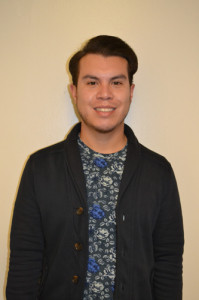WASHINGTON – Priscilla Trastaway and Jair Vergara, both 20, from Paterson, N.J., are a young couple who have decided that chastity is the best way to prevent difficult situations, including a possible abortion.
“We decided that we were going to be pro-life,” Trastaway said. “It’s a difficult decision to make as a young couple, but we did.” Vergara said that being pro-life is like a ratio of one to a hundred. “There is a lot of opposition,” Vergara said. “Especially with being the age we are. But we have to be prudent when speaking about being pro-life.”
The couple, who have been dating for a year, was among the Latinos X La Vida – Latinos for Life – organization that took part in Thursday’s March For Life, the leading movement for anti-abortion groups.
It began as a small demonstration Jan. 22, 1974, on the first anniversary of the Roe v. Wade Supreme Court decision that legalized abortion.
Based in the Bronx, N.Y., LXLV is a coalition that educates young Latino adults on abortion to mobilize their efforts in the anti-abortion movement while creating leaders in the Latino community.
According to the Guttmacher Institute a sexual and reproductive health institute, 25 percent of women having abortions in the U.S. are Hispanic.
“The Latino community is a complex one,” Torres said. “We decided to cater a collective Latino community because of the many different aspects of our culture. We needed a true expression of what our community needs – education and truth. There are many factors that aren’t addressed within the Latino pro-life movement.”
Among those factors is that Latino communities are targeted in favor of abortion instead of helping to prevent it.
Eliana Perez, 24, assistant program director for LXLV, said Latino communities need to understand that sexuality isn’t their totality.
“Amongst Latino families, sexual activity, including abortion, is taboo,” Perez said. “Therefore, we don’t have a lot of help preventing sexual activity.”
Perez said Latinos also need to realize that this isn’t just a Latina issue, but also a male issue.
“We are trained to think that the pro-life movement is all about Latinas,” Perez said. “There was a man involved in making the baby. What about his right and his privilege to be a father? That is a human right too.”
Giovanna Romero, 27, LXLV director of operations, said Latino communities are targeted for being among the highest with single-parent households. This is also part of the pro-life movement and LXLV wants to change that.
“In the Bronx,” Romero said, “70 percent of the community is single-parent homes. That is a very high number. Because of the conditions, women are made to believe that abortion is an option.”
Romero said community members need to help each other to become educated, build careers and earn decent wages to change those statistics.
“Acknowledging that there is help out there for unwanted pregnancies only makes it easier for the community to get to that point,” Romero said.
Torres said that LXLV tries to maintain family values and religion as key factors of the movement.
This was LXLV’s second year at the march. Aurora Tinajero, 66, director of Spanish Ministry for the Catholic Committee of North Texas, gave the keynote speech then.
“What they are doing is something lacking in the United States for many years,” Tinajero said. “Latinos stand for life, family and faith. However, there is a lack of awareness in understanding what abortion really is. They are victimized. Many come from countries very far away and are very vulnerable by the huge effort put forth by the abortion industry. We want to make them aware of what abortion really is. We want our Latino community to stop becoming victims.”
Reach reporter Jose Soto at [email protected] or at (202)408-1494.







